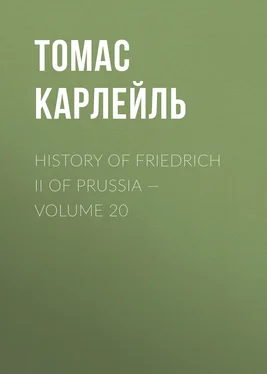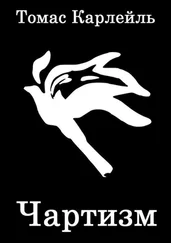Томас Карлейль - History of Friedrich II of Prussia — Volume 20
Здесь есть возможность читать онлайн «Томас Карлейль - History of Friedrich II of Prussia — Volume 20» — ознакомительный отрывок электронной книги совершенно бесплатно, а после прочтения отрывка купить полную версию. В некоторых случаях можно слушать аудио, скачать через торрент в формате fb2 и присутствует краткое содержание. Жанр: foreign_prose, История, literature_19, foreign_edu, foreign_antique, на английском языке. Описание произведения, (предисловие) а так же отзывы посетителей доступны на портале библиотеки ЛибКат.
- Название:History of Friedrich II of Prussia — Volume 20
- Автор:
- Жанр:
- Год:неизвестен
- ISBN:нет данных
- Рейтинг книги:5 / 5. Голосов: 1
-
Избранное:Добавить в избранное
- Отзывы:
-
Ваша оценка:
- 100
- 1
- 2
- 3
- 4
- 5
History of Friedrich II of Prussia — Volume 20: краткое содержание, описание и аннотация
Предлагаем к чтению аннотацию, описание, краткое содержание или предисловие (зависит от того, что написал сам автор книги «History of Friedrich II of Prussia — Volume 20»). Если вы не нашли необходимую информацию о книге — напишите в комментариях, мы постараемся отыскать её.
History of Friedrich II of Prussia — Volume 20 — читать онлайн ознакомительный отрывок
Ниже представлен текст книги, разбитый по страницам. Система сохранения места последней прочитанной страницы, позволяет с удобством читать онлайн бесплатно книгу «History of Friedrich II of Prussia — Volume 20», без необходимости каждый раз заново искать на чём Вы остановились. Поставьте закладку, и сможете в любой момент перейти на страницу, на которой закончили чтение.
Интервал:
Закладка:
Thomas Carlyle
History of Friedrich II of Prussia — Volume 20
BOOK XX.—FRIEDRICH IS NOT TO BE OVERWHELMED: THE SEVEN-YEARS WAR GRADUALLY ENDS—25th April, 1760-15th February, 1763
Chapter I.—FIFTH CAMPAIGN OPENS
There were yet, to the world's surprise and regret, Three Campaigns of this War; but the Campaign 1760, which we are now upon, was what produced or rendered possible the other two;—was the crisis of them, and is now the only one that can require much narrative from us here. Ill-luck, which, Friedrich complains, had followed him like his shadow, in a strange and fateful manner, from the day of Kunersdorf and earlier, does not yet cease its sad company; but, on the contrary, for long months to come, is more constant than ever, baffling every effort of his own, and from the distance sending him news of mere disaster and discomfiture. It is in this Campaign, though not till far on in it, that the long lane does prove to have a turning, and the Fortune of War recovers its old impartial form. After which, things visibly languish: and the hope of ruining such a Friedrich becomes problematic, the effort to do it slackens also; the very will abating, on the Austrian part, year by year, as of course the strength of their resources is still more steadily doing. To the last, Friedrich, the weaker in material resources, needs all his talent,—all his luck too. But, as the strength, on both sides, is fast abating,—hard to say on which side faster (Friedrich's talent being always a FIXED quantity, while all else is fluctuating and vanishing),—what remains of the once terrible Affair, through Campaigns Sixth and Seventh, is like a race between spent horses, little to be said of it in comparison. Campaign 1760 is the last of any outward eminence or greatness of event. Let us diligently follow that, and be compendious with the remainder.
Friedrich was always famed for his Marches; but, this Year, they exceeded all calculation and example; and are still the admiration of military men. Can there by no method be some distant notion afforded of them to the general reader? They were the one resource Friedrich had left, against such overwhelming superiority in numbers; and they came out like surprises in a theatre,—unpleasantly surprising to Daun. Done with such dexterity, rapidity and inexhaustible contrivance and ingenuity, as overset the schemes of his enemies again and again, and made his one army equivalent in effect to their three.
Evening of April 25th, Friedrich rose from his Freyberg cantonments; moved back, that is, northward, a good march; then encamped himself between Elbe and the Hill-Country; with freer prospect and more elbow-room for work coming. His left is on Meissen and the Elbe; his right at a Village called the Katzenhauser, an uncommonly strong camp, of which one often hears afterwards; his centre camp is at Schlettau, which also is strong, though not to such a degree. This line extends from Meissen southward about 10 miles, commanding the Reich-ward Passes of the Metal Mountains, and is defensive of Leipzig, Torgau and the Towns thereabouts. [Tempelhof, iv. 16 et seq.] Katzenhauser is but a mile or two from Krogis—that unfortunate Village where Finck got his Maxen Order: "ER WEISS,—You know I can't stand having difficulties raised; manage to do it!"
Friedrich's task, this Year, is to defend Saxony; Prince Henri having undertaken the Russians,—Prince Henri and Fouquet, the Russians and Silesia. Clearly on very uphill terms, both of them: so that Friedrich finds he will have a great many things to assist in, besides defending Saxony. He lies here expectant till the middle of June, above seven weeks; Daun also, for the last two weeks, having taken the field in a sort. In a sort;—but comes no nearer; merely posting himself astride of the Elbe, half in Dresden, half on the opposite or northern bank of the River, with Lacy thrown out ahead in good force on that vacant side; and so waiting the course of other people's enterprises.
Well to eastward and rearward of Daun, where we have seen Loudon about to be very busy, Prince Henri and Fouquet have spun themselves out into a long chain of posts, in length 300 miles or more, "from Landshut, along the Bober, along the Queiss and Oder, through the Neumark, abutting on Stettin and Colberg, to the Baltic Sea." [Tempelhof, iv. 21-24.] On that side, in aid of Loudon or otherwise, Daun can attempt nothing; still less on the Katzenhauser-Schlettau side can he dream of an attempt: only towards Brandenburg and Berlin—the Country on that side, 50 or 60 miles of it, to eastward of Meissen, being vacant of troops—is Daun's road open, were he enterprising, as Friedrich hopes he is not. For some two weeks, Friedrich—not ready otherwise, it being difficult to cross the River, if Lacy with his 30,000 should think of interference—had to leave the cunctatory Feldmarschall this chance or unlikely possibility. At the end of the second week ("June 14th," as we shall mark by and by), the chance was withdrawn.
Daun and his Lacy are but one, and that by no means the most harassing, of the many cares and anxieties which Friedrich has upon him in those Seven Weeks, while waiting at Schlettau, reading the omens. Never hitherto was the augury of any Campaign more indecipherable to him, or so continually fluctuating with wild hopes, which proved visionary, and with huge practical fears, of what he knew to be the real likelihood. "Peace coming?" It is strange how long Friedrich clings to that fond hope: "My Edelsheim is in the Bastille, or packed home in disgrace: but will not the English and Choiseul make Peace? It is Choiseul's one rational course; bankrupt as he is, and reduced to spoons and kettles. In which case, what a beautiful effect might Duke Ferdinand produce, if he marched to Eger, say to Eger, with his 50,000 Germans (Britannic Majesty and Pitt so gracious), and twitched Daun by the skirt, whirling Daun home to Bohemia in a hurry!" Then the Turks; the Danes,—"Might not the Danes send us a trifle of Fleet to Colberg (since the English never will), and keep our Russians at bay?"—"At lowest these hopes are consolatory," says he once, suspecting them all (as, no doubt, he often enough does), "and give us courage to look calmly for the opening of this Campaign, the very idea of which has made me shudder!" ["To Prince Henri:" in Schoning, ii. 246 (3d April, 1760): ib. 263 (of the DANISH outlook); &c. &c.]
Meanwhile, by the end of May, the Russians are come across the Weichsel again, lie in four camps on the hither side; start about June 1st;—Henri waiting for them, in Sagan Country his head-quarter; and on both hands of that, Fouquet and he spread out, since the middle of May, in their long thin Chain of Posts, from Landshut to Colberg again, like a thin wall of 300 miles. To Friedrich the Russian movements are, and have been, full of enigma: "Going upon Colberg? Going upon Glogau; upon Breslau?" That is a heavy-footed certainty, audibly tramping forward on us, amid these fond visions of the air! Certain too, and visible to a duller eye than Friedrich's; Loudon in Silesia is meditating mischief. "The inevitable Russians, the inevitable Loudon; and nothing but Fouquet and Henri on guard there, with their long thin chain of posts, infinitely too thin to do any execution!" thinks the King. To whom their modes of operating are but little satisfactory, as seen at Schlettau from the distance. "Condense yourself," urges he always on Henri; "go forward on the Russians; attack sharply this Corps, that Corps, while they are still separate and on march!" Henri did condense himself, "took post between Sagan and Sprottau; post at Frankfurt,"—poor Frankfurt, is it to have a Kunersdorf or Zorndorf every year, then? No; the cautious Henri never could see his way into these adventures; and did not attack any Corps of the Russians. Took post at Landsberg ultimately,—the Russians, as usual, having Posen as place-of-arms,—and vigilantly watched the Russians, without coming to strokes at all. A spectacle growing gradually intolerable to the King, though he tries to veil his feelings.
Читать дальшеИнтервал:
Закладка:
Похожие книги на «History of Friedrich II of Prussia — Volume 20»
Представляем Вашему вниманию похожие книги на «History of Friedrich II of Prussia — Volume 20» списком для выбора. Мы отобрали схожую по названию и смыслу литературу в надежде предоставить читателям больше вариантов отыскать новые, интересные, ещё непрочитанные произведения.
Обсуждение, отзывы о книге «History of Friedrich II of Prussia — Volume 20» и просто собственные мнения читателей. Оставьте ваши комментарии, напишите, что Вы думаете о произведении, его смысле или главных героях. Укажите что конкретно понравилось, а что нет, и почему Вы так считаете.









